| |
|
|
STERILIZATION ROOM |
|
In health care, dentistry has long been at the forefront of the
development of new products and procedures that reduce the
potential for disease transmission. Much of this is achieved
through sterilization. Sterilization is the destruction of
all living micro-organisms, including spores (reproductive
bodies) of the hardiest bacteria and fungi.
Many of the instruments used in dentistry need to be
sterilized. The instruments that contact teeth in drilling
and polishing are either sterilized or discarded between
patients. All dental offices have extra sets of instruments
which allows for proper sterilization time.
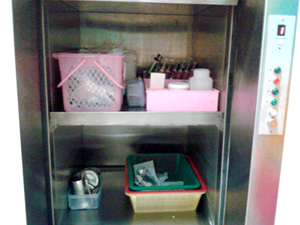 Special container Elevator
Special container Elevator |
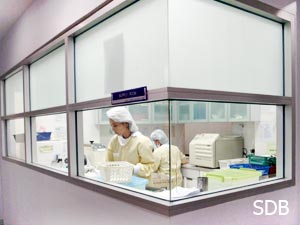
Sterilization room
|
Class B Autoclaves
We are now using an autolclaving machine, a dental sterilizer that processes
instruments faster and more effectively than ever before. In autoclaving,
instruments (which are first cleaned, dried, and placed in a special steam-penetrable
wrap), are subjected to pressurized steam for 15 to 20 minutes. The
instruments are then left in their protective packaging until they are
needed.
With its Europa autoclaves in the "Vacuklav" -series, MELAG offers three autoclaves which are a step ahead of the require-ments of our times.
We have in fact spared nothing in technical innovations to ensure that this family of autoclaves satisfies all requirements of the
upcoming European Standard prEN 13060 which will be placed on "Class B" autoclaves. Autoclaves of the "Vacuklav"-family feature
multiple sub-atmospheric pulsing for pre- and post-sterilization air removal.
An innovative microprocessor control system provides closed-loop control and monitoring of sterilization. "Vacuklav"
-autoclaves can be easily connected to the MELAG MELAdem37 and MELAdem47 water-treatment systems for automatic
supply of high-quality water. In such configurations, a conductivity measuring unit for checking water quality (conductivity sensor)
which is integrated in the autoclaves will check the quality of the water supplied. A serial interface for connection to the
MELAprint42 dot matrix printer, or to a computer in the doctor's practice, provides documentation of the success or failure of the sterilization process.
|
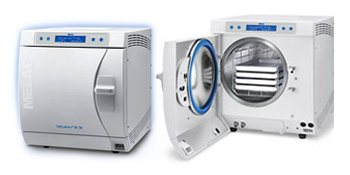
Vacuklav Autoclaves
|
MELASEAL
Sterilization in an autoclave is the safest way for prevention of infections. After sterilization, however,
care must be taken that instru-ments are not contaminated again. The MELAseal100 und MELAseal101
Package Sealing Devices can effectively seal sterilized instruments so that they are stored while being
safely protected against contamination. Without great physical effort, these two models produce
optimal sealing seams 10 mm wide, with precise sealing pressure. DIN 58953 specifies sealing seams at least 8 mm wide.
The MELAseal101 Package Sealing Device is always immediately ready for use, without a heating-up period. When the user turns the crank,
the pressure bar is pressed against the sealing bar. This procedure automatically starts the sealing process.
Two signal lamps show when the sealing is finished (after 2 ... 5 seconds). The integrated cutter cuts off bags /
wrappers to the required length during the sealing procedure. These wrappings can be more economically processed then finished plastic-film bags.
After the operator switches on the power to this device, it takes approx. 2 minutes until the cold unit heats up to operating temperature.
When the signal lamp goes off, this means that the MELAseal100 Economic is in the ready mode and can go to work.
When the operator turns the crank, this presses the pressure bar against the heated aluminium rail. After only two (2) seconds,
the sterilization wrapper has been properly sealed in accordance with relevant standards, with a sealing seam of 10 mm width.
The integrated cutter cuts off bags / wrappers to the required length during the sealing procedure.
These wrappings can be more economically processed than can finished plastic-film bags. |
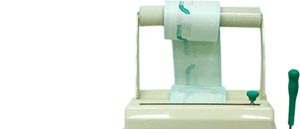
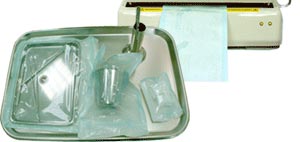
Package Sealing
|
See-through sterilization packaging
Before sterilization, instruments are sealed into a sterilization package and then placed into the autoclave.
After sterilization, the instruments are kept sealed in the package, as protection against contamination,
until their next use. The MELAfol see-through sterilization packaging consists of a paper-plastic film combination,
and it has the advantage of allowing the instruments to be easily seen. The doctor can remove the instrument
from the package in the presence of the patient, which is impressive evidence that the physician's practice is being hygienically managed.
MELAfol is impervious to pathogens (germ-tight), capable of being hot-sealed, resistant to wrinkling, and easy to open
(owing to its peelable sealing seams). MELAfol also features a treatment indicator in accordance with DIN 58 953, part 4,
which turns from blue to brown during steam sterilization. It is therefore not necessary to stick indicator tape onto the packages.
The user opens the packages by peeling apart the 10-mm seam on the side, in the direction of the arrow.
According to DIN 58 953, part 7, sterilized instruments may be stored in such packages for a maximum of six (6) weeks: for example, in a drawer.
|
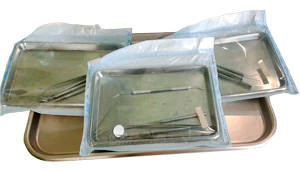
See-through sterilization packaging
|
MelaQuick
The compact and space-saving fast autoclave for the sterilzation of dental handpieces, contra-angles, and turbines:
with an overall operation time of only six (6) minutes, including drying. This time also applies to work with wrapped instruments.
The MELAquick12 operates with a single-use (non-reusable) water system to ensure longer service life of the autoclave and the sterilized instruments.
The MELAquick12 features a serial printer interface for connection to the MELAprint42. The MELAquick12 also offers an additional steam-pressure
disinfection program for older dental handpieces and contra angles which cannot be sterilized.
|
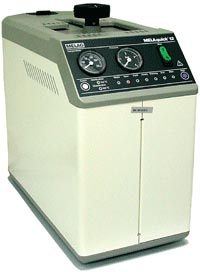
MelaQuick
|
Tray cassettes and sterilization contrainers
It is not enough to properly sterilize medical and dental instruments: these instruments must also be stored free of germs until they can be used again.
All MELAG Vacuklav and Euroklav autoclaves with Tray Mount C are equipped as standard feature to accept six (6) trays or three (3) standard tray cassettes.
These autoclaves are also available with Tray Mount B to accept four (4) standard tray cassettes. MELAG standard tray cassettes are equipped with a sterile
filter cloth in the bottom and the cover. They are also available without the sterile filter cloth: i.e., with only perforations in the bottom and cover.
Sterilization containers are used for this purpose. MELAG sterilization containers have perforations in the bottom and in the cover, which are covered germ-tight by a special sterile filter cloth (which can be exchanged). In accordance with the coming European Standard prEN 868, MELAG sterilization containers are secured with a latch and are provided with a cover seal.
|
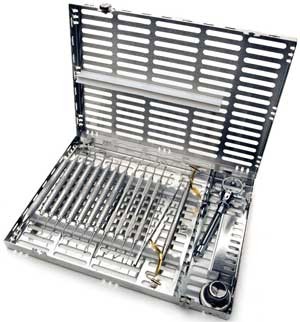
Restoration sterilization cassettes |
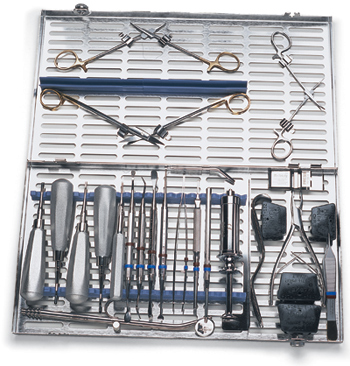
Oral Surgery sterilization cassettes |
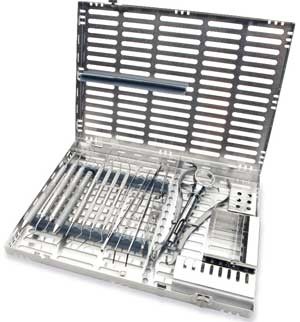
Endodontics sterilization cassettes |
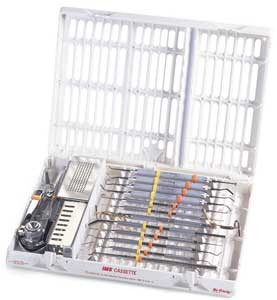
Resin sterilization cassettes |
|
BioSonic
This powerful 1 gallon unit features a "hinge action" lid
that reduces noise and limits airborne vapors. The modern
design incorporates form and function with a reinforced
plastic exterior to resist scratches, chemicals, physical
shocks, and limit operational noise.
- Cleans tiny crevices and areas impossible to reach, even with a brush.
- Reduces the risk of exposure to bacteria and viruses found on instruments.
- Reduces splatter of germ-ridden solutions resulting from hand cleaning.
- Prolongs instrument life.
- Optimum cleaning with unsurpassed quiet operation.
|
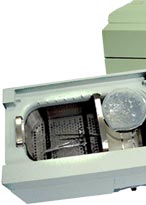 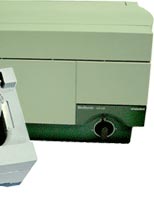
BioSonic
|
Assistina
The perfect maintenance system.
The air-driven cleaning and maintenance unit is designed for
- straight and contra-angle handpieces
- turbines (except air-bearing turbines)
- air motors
- air-driven scalers
The automatic instrument
- cleaning and lubrication of the internal components with service oil
- cleaning of the spray water and spray air channels with cleaning fluid
- flushing through with compressed air
|
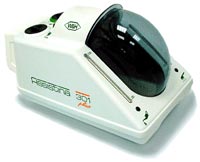
Assistina |
|








 Special container Elevator
Special container Elevator 




